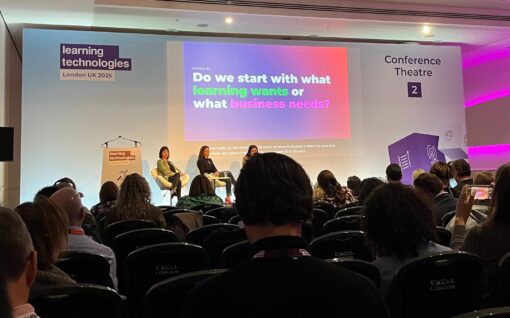Keep asking good questions, L&D. And keep collecting data

Last week I co-facilitated a webinar with Gent Ahmetaj, exploring learning and development’s role in helping managers support virtual learning. The idea for the event came out of a piece I had previously written on the same subject.
Emerald Works sits on a lot of data that looks at learning from the perspective of learning teams and employees and managers. Drawing out practical insights from the data was the catalyst for writing the article and running the associated event.
For me, the event was an important reminder of why L&D must pay attention to data.
In the first part of the webinar I posed a few questions to the participants. The aim of this was to invite participants to reflect on their experiences of being managers and also how well supported they felt in supporting virtual learning.
We had just over a hundred participants and the answers were really interesting.
Asked how important managers are in championing and supporting learning in virtual environments, 91% said very important and 9% said quite important.
We asked how many participants were themselves managers and 47% said they were. We followed this by asking the managers if they are well supported in helping their team to learn and 59% said yes, while 41% said no.
Online events and meetings are good for collecting data and insights from participants. These allow you to facilitate the conversation in a highly responsive way. For example, the fact that L&D professionals feel managers are important in championing and supporting learning in virtual environments and yet 41% of them who are managers say they are not well supported in helping their team to learn raises some interesting questions. Why is this? Are managers in learning assumed to be good at supporting colleagues? What stops managers being well supported?
For our session, we continued our conversation to share and discuss Emerald Works data and the insights it provides in helping managers support virtual learning.
As a senior research analyst, Gent was able to bring the data to life by looking at trends over time as well as the more immediate impact of Covid-19 on learning delivery. In preparation for the event, Gent asked me to consider the questions that I wanted answers to on this topic. Why? Because this is the best way to approach data. Specific questions and assumptions can be tested, giving insight that might challenge your thinking or the way you do things.
One insight that jumped out at me during our discussions was the importance of the relationship between a manager and their team members. A positive, supportive and encouraging relationship is a key part in helping team members learn and develop themselves. That’s why 94% of top performing companies in the annual Emerald Works Health Check develop line managers as coaches (vs 28% across the rest of the data set).
But the data shows there are other factors that determine how effective team members are at learning for themselves. A key factor is the role of the organisation in supporting managers. That includes a manager’s manager. For individual employees to thrive there needs to be a positive interplay between them and their manager and the manager and the organisation. Managers can have a hugely positive impact on employees but it would be wrong for organisations to believe team development is only the preserve of the manager.
Which brings us back to the data from the participants in the event. If L&D managers do not themselves feel supported in supporting learning in their teams, can we expect them to be motivated to support their teams effectively?
One question that came up during the webinar was what data to measure and how to measure it. This is a priority for learning. Covid-19 has been a catalyst for rapid changes in the way organisations work and learn and L&D teams need to collect data that can help guide them and the organisation now and into the future. Emerald Works data is a useful data source for L&D but it is only one. L&D teams need to collect their own to understand what’s working and why and to use that to shape future strategy.
When it comes to supporting managers, the data tells us to:
- Check your assumptions about managers and what support they would like and how they like to learn
- Provide managers with the resources they need to support their teams to learn – most organisations don’t do this
- Develop managers as coaches – it is in a coaching capacity that managers can support the development of employees
You can see a recording of the webinar here.
And the slides are available here: Insights Media – Emerald Works – webinar deck – L&D’s role in helping managers support virtual team working
We produced an insights article for Emerald Works that shaped the thinking for this webinar: Stepping up: The manager’s role in optimizing virtual team learning

